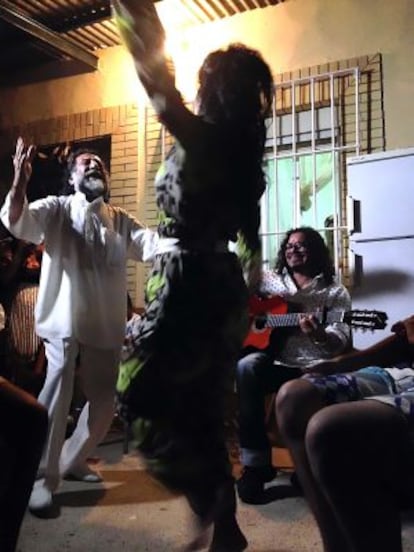Gypsy fiestas change their tune
Traditional flamenco is giving way to reggaeton, salsa and rumbas at Roma celebrations

Gone are the times when Gypsy weddings, baptisms and birthdays were celebrated with tangos, seguiriyas and bulerías until daybreak.
Nowadays you might still hear these classic flamenco rhythms towards the end of a celebration, when older guests take over the dance floor. But for the most part, young Roma prefer fusion sounds that merge flamenco with salsa, reggaeton and rumba.
“It used to be that everything was done with a group of singers and hand-clapping; the bride or hostess would take someone out on to the dance floor, but the fiesta changed when the piano and drums were introduced,” explains Pedro Molina, a photographer who has been documenting Gypsy celebrations for the last 35 years.
Not a Roma himself, his success is based on his discretion and respect for the community’s customs, which include inserting a white handkerchief into the bride’s vagina to see whether her hymen ruptures and blood comes out – proof of her virginity.
It’s as though the sound of coughing were being amplified” Manuel Molina, singer
At the beginning of his career, “weddings would go on for three days without interruption,” he recalls. “But the crisis has reduced that to as little as one day.”
Molina will not offer his opinion on the new flamenco fusion that features prominently at today’s celebrations. Nor will Raimundo Amador, the 55-year-old guitarist who has himself blended flamenco with rock: “Who among us can tell young people what they should be listening to?”
No wonder. Who knows what his own father, Luis Amador, thought when he saw his son playing Jimi Hendrix.
But flamenco singer Manuel Molina has provided an eloquent description of what the new rhythms sound like: “It’s as though the sound of coughing were being amplified.”

There is one band that stands out for producing “innovative” work these days: Los Yumay come from the notorious Seville projects known as Tres Mil Viviendas, and they play rumba with a Latin touch. The lead singer, Horacio Silva, 37, dropped out of school at age 16 and tried his hand at many jobs before succeeding as a singer and songwriter. He has been supporting his family for over a decade on what he makes.
“I can’t complain,” he says via telephone from the rehearsal studio. “I ask party organizers to come to the studio and tell me about the event, including the hosts’ names and their story, including their uncles, aunts and cousins; then we make music around that.”
Enrique Salazar, the guitarist, says they cover reggaeton, salsa and flamenco, then upload their work on to the internet.
“Many people grab it from there and play it across Spain, without paying royalties,” he says.
Los Yumay do not have a label to back them up, and until now they have never played outside Roma circles. Their income comes from live gigs, which bring in between €500 for the full package and “enough to cover costs, plus a small gift.”
Back in the good old days, people hired well-known artists such as Niña Pastori and Parrita, but the crisis has hit everyone’s pockets.
Tu suscripción se está usando en otro dispositivo
¿Quieres añadir otro usuario a tu suscripción?
Si continúas leyendo en este dispositivo, no se podrá leer en el otro.
FlechaTu suscripción se está usando en otro dispositivo y solo puedes acceder a EL PAÍS desde un dispositivo a la vez.
Si quieres compartir tu cuenta, cambia tu suscripción a la modalidad Premium, así podrás añadir otro usuario. Cada uno accederá con su propia cuenta de email, lo que os permitirá personalizar vuestra experiencia en EL PAÍS.
¿Tienes una suscripción de empresa? Accede aquí para contratar más cuentas.
En el caso de no saber quién está usando tu cuenta, te recomendamos cambiar tu contraseña aquí.
Si decides continuar compartiendo tu cuenta, este mensaje se mostrará en tu dispositivo y en el de la otra persona que está usando tu cuenta de forma indefinida, afectando a tu experiencia de lectura. Puedes consultar aquí los términos y condiciones de la suscripción digital.









































